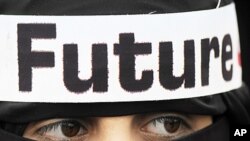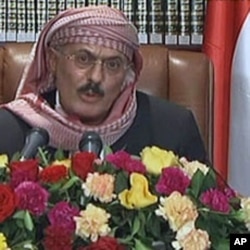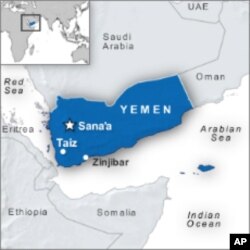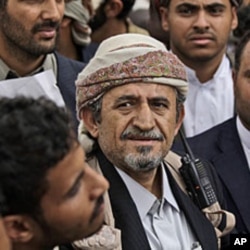This young Arab republic has spent eight months trying to replace its president of 33 years. A millennium of traditions maintained by a collection of competing tribes could determine whether students and civil society demonstrators will yield a multi-party democracy or if the nation will witness the death of hundreds of more pro-democracy protesters.
Yemen’s tribalism is playing out in differing ways in the protests in the cities and in the countryside, and some experts are concerned that civil war could break out. Yemen’s south, which joined its northern neighbors to form the Republic of Yemen in 1990, has been poorly served by its leaders before and after unification.
In the fall of this Arab Spring, the future of free elections in a small country on Saudi Arabia’s southern border is still uncertain. Riyadh and Washington are still reluctant to step in and resolve Yemen’s political disarray, yet one thing is sure: the Saleh regime that has operated as a family-run business that bought the loyalty of most of the more than 190 tribes of the country is threatened.
What went wrong?
The president for too long
“It has been for too long,” said Khaled Fattah, who studies state-tribe relations in the Arab world and is a guest lecturer at the Center for Middle Eastern Studies at Sweden’s Lund University. Yemen’s youth and its tribes are changing.
“As you know there has been a population explosion and there is a new generation which is not influenced by the tribal system,” said Fattah. Three quarters of Yemen was born in the president’s lifetime and 70 percent of Yemenis are under the age of 25. And a new generation emerged more globally oriented than tribally focused.
“So I think that it was a long period of dancing on the heads of snakes, as the president has said,” Fattah recalled.
President Ali Abdullah Saleh’s rule has depended upon the appointment of his children, nephews, cousins, in-laws and neighbors from the village of his birth to fill major government positions and to run government-controlled businesses.
He has relied on the practice of offering houses, cars, construction, import and export opportunities and the discreet monthly payments by his Ministry of Tribal Affairs of between $100 and $500 to an estimated 6,000 sheikhs among the more than 190 tribes of Yemen. Many of these benefits were directed to the Hashid and Bakil confederations of tribes from the north, where the president is from.
Actually, the amounts of payments were much more, said Charles Schmitz, the president of the Institute of Yemeni Studies and a geographer at Towson University in Maryland who has studied the political economy of development in Yemen for more than 15 years.
Schmitz said Saleh’s patronage system was effective for many years but in addition to the skyrocketing growth of the younger demographic, the attitudes of the tribesmen are changing.
“In fact, we’ve seen quite a lot this summer in the protest movement of tribesmen simply ignoring what their sheikhs, being beholden either to the leaders of the opposition or the leadership of the president, and going off to do whatever they want,” said Schmitz.
In Taiz in the south, tribesmen joined the youth movement to recover the center of town after Saleh’s security forces burned the square students had previously occupied. “They came down not as tribesmen but as individuals.” They left their long jambiya daggers at home. “They abandoned their weapons and came down to the street. This is something new,” said Schmitz.
Some tribes are more political than others
By Schmitz’ definition, a tribe is a geographically defined living unit that focuses on local issues such as resources and security. The tribe’s members articulate a conservative traditional ethic and expect their sheikhs to guarantee a system of justice and to arbitrate differences with their neighbors. Violent aggression is only evident in about 20 percent of the tribes, mostly among the Hashid federation in the north. Schmitz said ideologies are not essential.
Nevertheless, some influential leaders of the large northern confederations have recently joined the movement for regime change and now stand behind the youth movement’s demonstrations. Fattah said these northern supporters, many of them once close to Saleh, see an opportunity in the demonstrations to form a political opposition to his regime.
“The military has been tribalized,” said Fattah. “The security apparatus has been tribalized. What we now have during the revolution is the division with the opposition. And this division is not related to the protection of state institutions. It’s a reflection of a tribal competition.”
“If you look at the elite level and particularly in Sana’a, you’re seeing a competition among traditional rivals playing out,” said Leigh Miles, the Yemen program manager for the National Democratic Institute in Washington, D.C. Miles has spent six years watching Yemen’s political changes.
She observes several overlapping movements of opposition to Saleh that have risen in recent months to offer a ruling transition in Sana’a: the Joint Meetings Party, which spawned the Preparatory Committee for National Dialogue, and the political interests of the northern tribes in the leadership of Brigadier General Ali Mohsen al-Ahmar, a relative of the president, and Sheikh Sadique al-Ahmar, the head of the Hashid confederation and Yemen’s sheikh of sheikhs.
“Outside of Sana’a, I think the relationship with the tribes is different,” said Miles. “Tribal leaders are part of the movement. Tribesmen are at the squares. They are protesting. They are supporting the aims of the revolution. I don’t see the tribes attempting to co-opt the aims of the revolution. I’m seeing remarkable unity among the tribes in support of the revolution.”
Keeping the pro-democracy movement young
“There have been a lot of reports about the opposition trying to hijack the revolution and trying to take it over,” said Adel Mozip, a journalist in Michigan, is one of a small group of Yemeni-Americans forming a speaker’s bureau to establish the youth movement’s political agenda for a western audience.
“The opposition declared they are here with the revolution three months after the people were on the streets. The opposition did not really drive the revolution. It’s not like they are in the lead and they can tell the youth what to do,"
“Yemen will never be under a one-man rule again,” Mozip vowed. “It’s time for democracy. Enough is enough.”
But the solution may come from outside of Yemen. Those interviewed raised the possibility of the United States and Saudi Arabia taking a more aggressive step to resolve Yemen’s governance dilemma. Fattah says that, like Saleh, Saudi Arabia is believed to pay substantial sums to Yemen’s sheikhs, and gives the largest amounts to the leaders of the Hashid confederation whose tribes live along the Saudi borders. The Saudis are concerned about a rising revolutionary spirit along their borders.


















